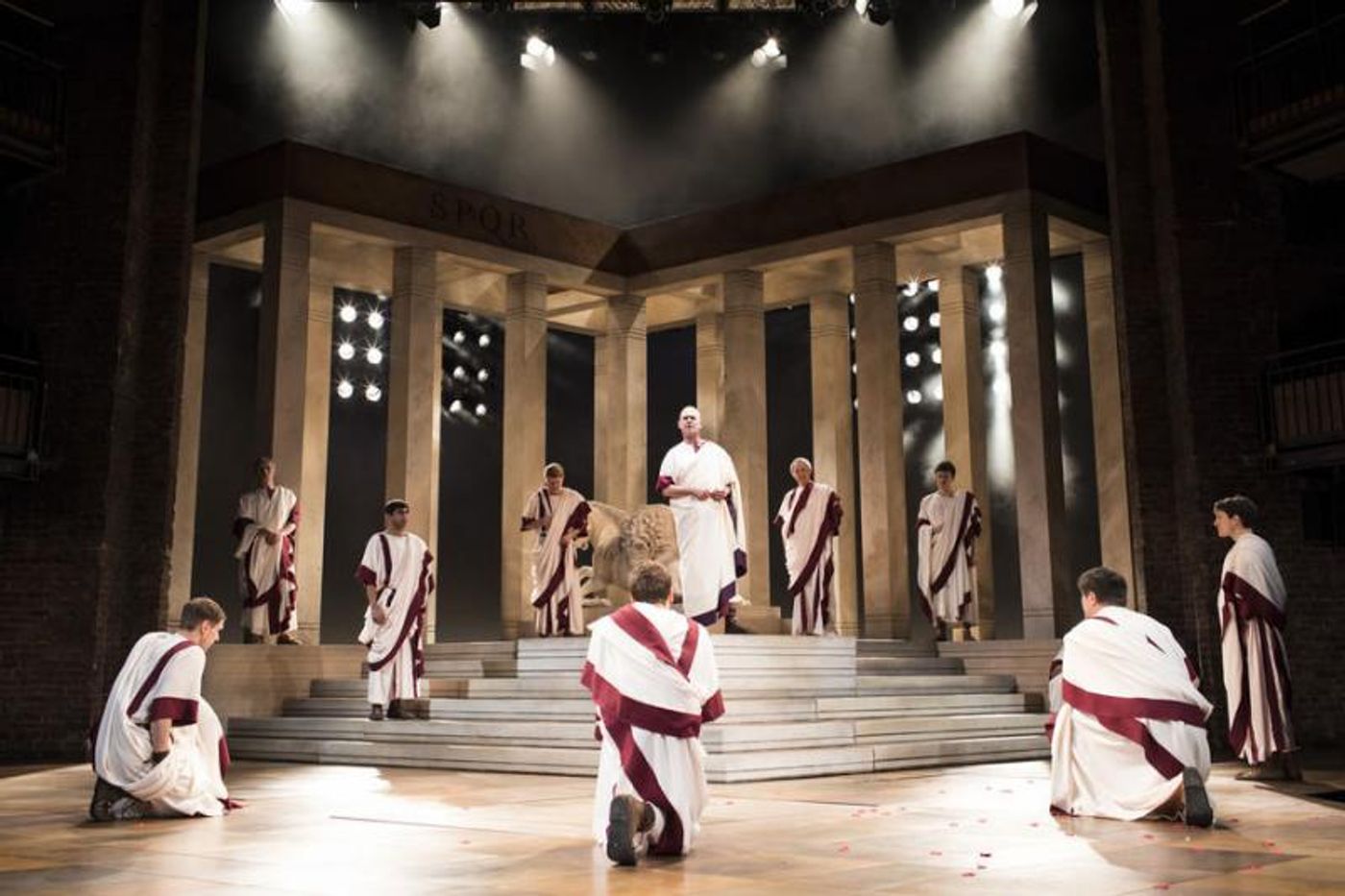Interview: Martin Hutson talks ROME MMXVII SEASON

This Winter, the Royal Shakespeare Company's Rome MMXVII Season transfers to the Barbican Centre. Martin Huston returns to the RSC to play Cassius in Julius Caesar and Saturninus in Titus Andronicus.
What were your first experiences with Shakespeare?
I remember doing As You Like It and King Lear at A-Level. We had this brilliant English teacher. While we were reading it out, he'd whisper into the air recurring themes! It was silly, but brilliantly evocative.
So I enjoyed that, but I didn't really get Shakespeare until years later. I trained at LAMDA (straight out of school), and then left when I was 20, so I was still very young.
I played Laertes in a production of Hamlet at the Birmingham Rep, and the late, great Gerard Murphy was playing Claudius. He took me aside during rehearsals and said, "Look, we could just talk about your verse speaking". And he just sort of taught me how to do it. And over the course of that job, from his help and having a go at it with those things in mind, I suddenly started to really love it.
And that passion has clearly stayed with you
Yes, I did loads of classical work when I left drama school - it was all pre-20th century. But I remember I was desperate to do something modern. And when I finally did, I really missed the verse!
Now I teach it a bit at LAMDA and at Guildhall, and I've directed a fair amount of Shakespeare, so I really love it. It's very easy to nerd out with! And now I'm back at the RSC, where I've worked three times before [in Titus Andronicus, The Heart of Robin Hood and As You Like It].
You're appearing in not one but two productions this season: Julius Caesar and Titus Andronicus. How did you approach that?
Well, it's been really good for me. Often when I accept a job, I kind of know who I think the character is. And by the time we get to the read-through on the first day, I've made some choices, I have a kind of angle I'd like to approach it from.
And when I came to actually working on these characters, I hadn't got a clue! They're so odd and changeable and contradictory and their motivations are buried quite densely. So the read-throughs were just me trying to say the lines and not fall off my chair!
.jpg?format=auto&width=1400)
So after read-throughs, what did you learn about your character Cassius in Julius Caesar?
Cassius is this strangely mercurial, highly strung, bright and occasionally hysterical man. He's a great tactician and has a great moral compass in terms of the bigger picture.
And yet he constantly allows his friend Brutus to lead. And every time he allows Brutus to lead, it goes wrong. And he doesn't learn his lesson continuously. I wanted to work out why: why does he do this again and again?
That relationship is really interesting. Cassius says to Brutus: "I know, / When thou didst hate [Caesar] worst, thou lovedst him better / Than ever thou lovedst Cassius".
Exactly! And that's in the tent scene, this big row with Brutus. And he just behaves hysterically throughout the scene. So you've got to hit this level.
And ultimately you discover that the amount of anger and frustration and bitterness and vitriol that comes out is entirely in proportion to how much he loves Brutus. He's screaming at him because it hurts. The height of his hysteria is the depth of his love in negative. It's just endless joy playing him.
This is your second production of Titus Andronicus at the RSC. What's it like returning to the play?
Well in my previous production, John Lloyd Fillingham, who played Saturninus, was really brilliant. And I thought, "Oh, Saturninus is a great part!" And then I realised that he had duped me into thinking I might be able to do something similar!
I was worried, because there is a similarity in that both Saturninus and Cassius are quite highly strung. They do contradict themselves, and they both act on instinct a little bit. Except Saturninus really is not very bright at all. He acts vindictively, impulsively and can't see the bigger picture at all. I was worried to begin with that there was a similarity in the rashness of them. But the intelligence is the divider.
You're performing both plays with the same group of actors. How have you found working with this company?
Genuinely in the 20 years I've been working, this is the most generous, uncomplaining, hard-working group of people with such great integrity. They're just a really wonderful group of people.
And in this company, there's this group of actors who for about six or seven months were perpetually in rehearsals. They were either rehearsing a play, teching it, previewing it, opening it, starting understudy work, then as soon as that was running, working the third show and the third slot.
It's relentless. And they're just so generous and just get on with it. And on stage you know they're right there with you, they'll do whatever they can to facilitate everyone else doing their work.

What was it like to bring these shows before audiences at the Royal Shakespeare Theatre?
It was great. That theatre is so terrific for these plays, which have a lot of direct address in them.
When people are actually talking to Rome or referring to Rome, you have the audience right there. The Royal Shakespeare Theatre so lends itself to that interaction, that relationship.
People are reachable and you can see the whites of their eyes, even the people right at the top. So that was really wonderful; it's such a lovely theatre to be in.
Do you think the dynamic with the audience will change in its transfer to the Barbican?
Well it's my first time performing at the Barbican, and we've had two days in the space now. We're just teching Julius Caesar and I do wonder what that will change to, when the audience is going to be much more in the dark.
It does feel slightly more presentational here at the moment...that sounds like a negative, but I think it also has a quality of us being able to control the frame more, tell the story in potentially a clearer way. A thrust space is a lot more democratic in that the audience can choose where to look more. Whereas in a proscenium arch like the Barbican, you can guide the audience's eye a bit more by giving focus.
So the already splendid set is actually even better here. That main bulk of the Capitol, those big white columns, they're much more centralised. Everything leads to it. In a thrust stage like the Royal Shakespeare Theatre, that depends on where you're sitting as to how dominant that is in your picture. In certain seats, that thing is very much a sideline. Here, you can't escape the Capitol.
rsc_222063_tmb-img-1824.jpg?format=auto&width=1400)
Why do you think these Histories still prove so relevant today?
I was offered this job back in August of last year. Obviously I was thrilled and to play Cassius would be very nice. And then the American election happened.
And suddenly I thought, "This is the best play I could possibly be doing". Not only in terms of reflecting the fears of the nation, but in terms of therapy for myself! Each night, we're able to do something about a terrible situation.
There's a shift to the right going on. I mean our country's in dreadful trouble. We've been completely disenfranchised by our Government. And we are seeing both our country and the world moving in a direction that we find abhorrent. And it feels that there is simply nothing we can do about it.
So we go to the world of Julius Caesar where that was happening and someone decided they would do something about it. It's rather a brilliant thing to be exploring, performing or watching. It's the play of the moment, and it's a brilliantly disruptive play.
Finally, why should people come and see these shows?
I think because the Roman plays are about the jostling as people try to establish society as we know it. We go from anarchy to some form of civilisation and out the other side. And each play deals with a slither of that process. So to have all four plays on and see what Shakespeare wants to say about that process, it's a real rarity.
And I think especially in this time of uncertainty, I think it's a brilliant coup that the RSC happen to have the establishment of democracy running as a box set over this terrifying time. That's why you should see them: it's a rare event to get that full picture.
Rome MMXVII Season at Barbican Centre until 20 January, 2018
Julius Caesar, 24 November-20 January, 2018
Titus Andronicus 7 December-19 January, 2018
Photo credit: Helen Maybanks
Videos

